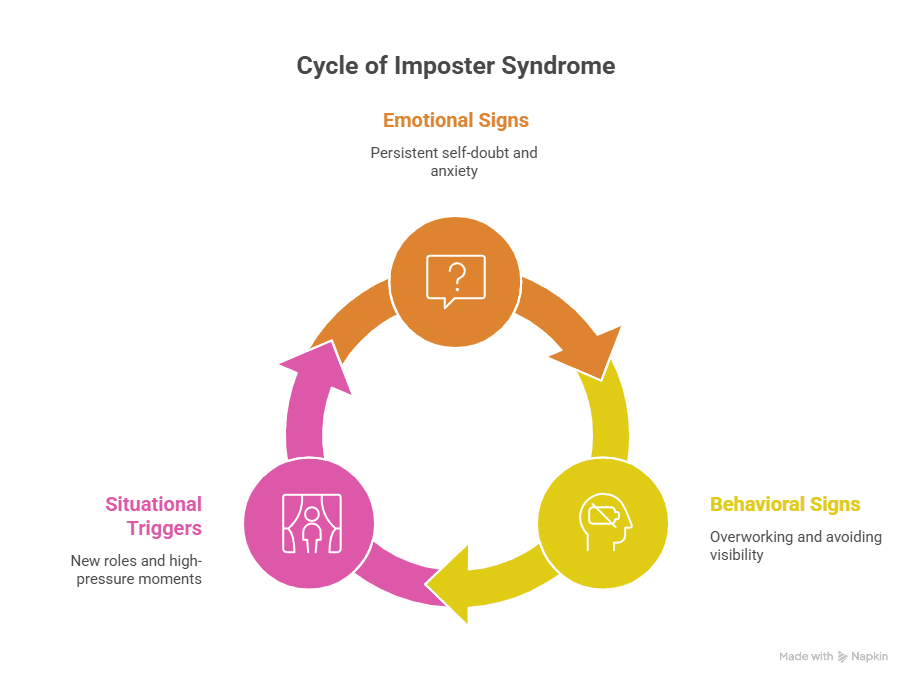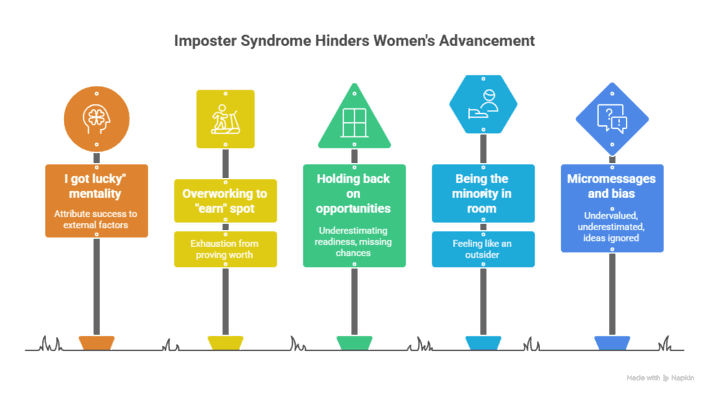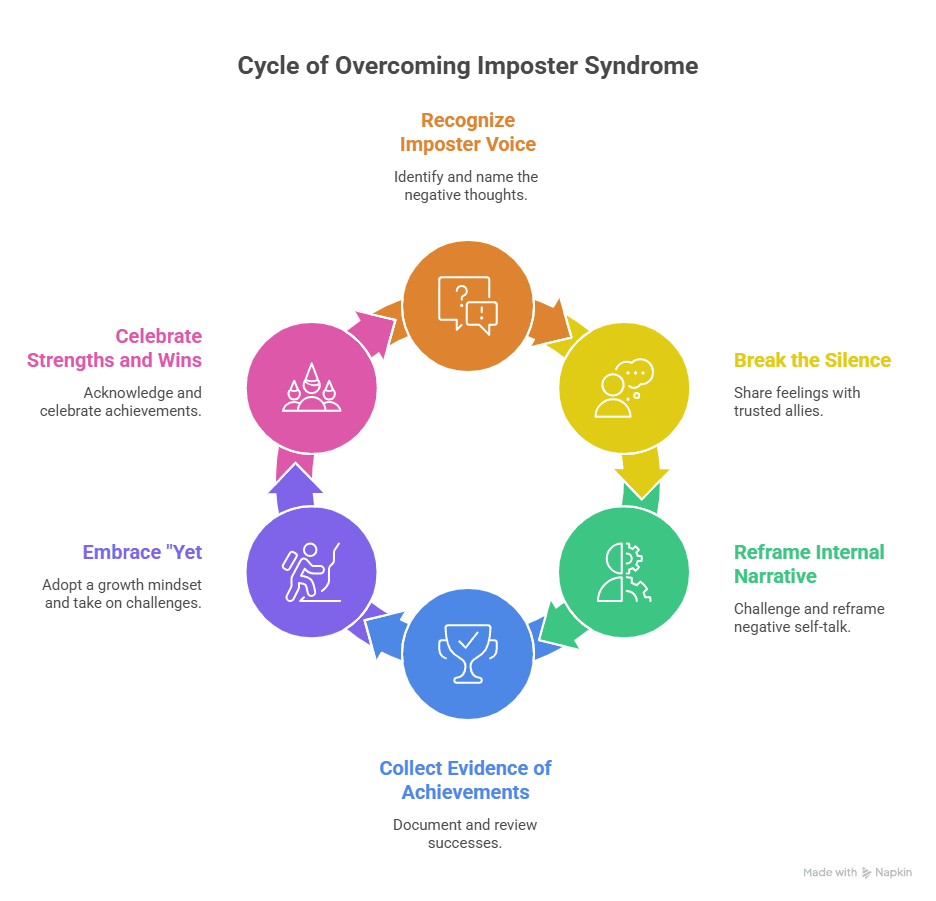What Is Imposter Syndrome? Meaning, Signs, and Overcoming the “Fraud” Feeling at Work

Have you ever achieved something — a new job, a promotion, praise from your boss — yet felt like you didn’t truly earn it? Maybe a little voice in your head whispers, “They’re going to find out I’m not actually qualified for this.” If so, you’re far from alone. This sinking self-doubt, this feeling that you’re a fraud among your own accomplishments, has a name: imposter syndrome. And it’s especially common among high-achieving women in early to mid-career who, on paper, seem to have it all together, yet internally feel like they’ve just been “faking it.”
“Women are not broken. Systems are.”
Imposter syndrome doesn’t mean there’s something wrong with you. In fact, it often says more about the high (and sometimes unfair) standards and biases in our environments than any real lack of ability. The term “imposter syndrome” (also known as the imposter phenomenon) describes a persistent belief that your success isn’t deserved or real – that you’ve fooled others into thinking you’re competent when you’re secretly certain you’re not. Psychologists first identified this phenomenon in 1978 while studying high-achieving women, noting a pattern of women feeling like intellectual frauds despite strong evidence of their talent . We now know anyone can experience imposter feelings, but they are particularly pervasive among women, especially those who often find themselves in male-dominated spaces or without role models they can relate to .
Imposter syndrome meaning
At its core, imposter syndrome is a chronic fear of being exposed as a fraud, no matter how much you’ve accomplished. You might credit your achievements to luck, timing, or help from others rather than your own abilities leadersadapt.comphys.org. You may feel you’re not as smart or capable as everyone “thinks”, and it’s just a matter of time before the facade crumbles. As one researcher explains, “Impostorism is feeling like an intellectual fraud even when there is strong evidence of success… you fear that one day you’ll be exposed as incompetent and undeserving of your success.” In other words, you struggle to internalize your wins – no matter how much you do, the confidence and validation never fully sink in . The thought lurks in your mind that maybe you just got lucky, maybe they overestimated you, and “What gives me the right to be here?” .
Ironically, those who feel like impostors are often exactly the high performers whose resumes show they do excel. Imposter syndrome feeds on this disconnect between external evidence of achievement and internal feelings of inadequacy. And it is incredibly common. Studies suggest roughly 70% of people will experience imposter syndrome at least once in their lives verywellmind.com. Even more striking, an estimated 75% of executive women report having felt like impostors at certain points in their careers . In other words, if you’ve been feeling like a fraud at work, you’re in very good company. The smart, capable women you admire may very well be fighting the same internal battle.
Signs and Symptoms of Imposter Syndrome

How do you know if what you’re dealing with is imposter syndrome? Imposter feelings can show up in your emotions, behaviors, and certain situations. Here are some key signs and symptoms to watch for:
Emotional Signs
- Persistent self-doubt: You constantly question your abilities and downplay your accomplishments, even when you have expertise. There’s an ever-present feeling of “I’m not good enough” despite positive feedback.
- Fear of failure and exposure: You live with a chronic fear that some mistake or lack of knowledge will reveal you as a fraud. Even minor errors or constructive criticism hit you hard, because they seem to “prove” you aren’t capable .
- Anxiety and stress: High levels of anxiety often accompany imposter syndrome. You might feel nervous before big projects or presentations, convinced you’ll mess up. You carry an underlying stress that you have to constantly prove yourself every single day.
- Feelings of inadequacy and guilt: No matter how much you do, you feel it’s never truly enough. You might also feel guilty, as if you’re deceiving others about your competence or taking a spot you don’t deserve. This can lead to imposter-related sadness or even mild depression over time .
Behavioral Signs
- Overworking and over-preparing: To avoid being “exposed,” you might work extremely hard or over-prepare for every task . You may arrive earlier, stay later, double-check everything, striving for perfection so no one can find a flaw. This often leads to burnout (since no one can sustain 110% effort 24/7).
- Perfectionism and procrastination: Imposter syndrome often goes hand-in-hand with perfectionism. You set impossibly high standards for yourself. Paradoxically, this can also lead to procrastination – if you’re afraid you won’t do it perfectly, you might delay starting at all. You might think, “If I’m not 100% sure I can ace this, why even try?”
- Avoiding visibility: People with imposter feelings often shy away from the spotlight. You might hesitate to speak up in meetings, avoid giving presentations, or decline opportunities because you don’t feel “ready” yet. You stick to what’s safe in order not to risk failure or attention.
- Not asking for help (the “Soloist” tendency): A common imposter behavior is thinking you have to do everything yourself to prove you can verywellmind.com. You might avoid asking questions or seeking mentorship, fearing it will confirm you don’t know enough. This “I should know it all already” mindset can actually stunt your growth and isolate you further.
- Downplaying achievements: When you do succeed, you dismiss it. You might attribute a successful project to luck (“It was just a fluke”), timing (“right place, right time”), or teamwork (“anyone could have done it, I just happened to help”) instead of owning your contributionleadersadapt.com. Compliments make you uncomfortable – you’ll respond with “Oh, it was nothing really,” automatically discounting your work.
Situational Triggers
Certain situations can trigger or intensify imposter syndrome. For example, entering a new role or environment where you feel inexperienced can set off those fraud feelings. Early-career women often experience imposter syndrome when starting a first big job or leadership position – suddenly you’re in charge, and you worry you’re not up to it. Being the “only” one in the room can also amplify imposter thoughts. Walking into a meeting where you’re the only woman, the youngest person, or the only person of color, and not seeing anyone who looks or sounds like you, can send the message “I don’t belong here” (even though you do). High-pressure moments like giving a major presentation, leading a project, or receiving an award can likewise spur that intense self-doubt: “If I were really supposed to be here, I wouldn’t feel so scared – maybe I’m not qualified after all.” Recognizing these triggers is important because it helps you understand that the situation is provoking your impostor feelings – not that you truly aren’t capable. Often, the more new or high-stakes the opportunity, the louder the imposter voice can get.
Imposter Syndrome at Work – Why So Many Women Feel Like Frauds on the Job

Imposter syndrome can affect anyone, but in professional settings, it tends to hit women particularly hard in early to mid-career. You might be managing a team for the first time, pursuing a promotion, or striving to make your mark in a company – and instead of confidence, you’re battling constant self-questioning. Here are some common ways imposter syndrome manifests at work and why ambitious women often experience it:
- “I got lucky” mentality:
In the workplace, women with imposter feelings frequently attribute their achievements to external factors. Did you meet your quarterly targets? You tell yourself, “The market was just right – anyone could have done that.” Did you get positive feedback from a client? You think, “They were just being nice.” This mindset can be so ingrained that even years of glowing performance reviews won’t convince you of your competence. On the outside, you’re successful, but on the inside, you’re constantly waiting for the other shoe to drop – convinced it’s just luck or goodwill keeping you afloat leadersadapt.com.
- Overworking to “earn” your spot:
Imposter syndrome often drives women to work twice as hard to feel half as good. You might believe you have to be perfect to justify your role, so you over-prepare and push yourself to the brink on every assignment . While a strong work ethic is admirable, doing it from a place of fear (rather than confidence) is exhausting and unsustainable. You may end up burned out or sacrificing work-life balance, yet still feel like it’s not enough. Meanwhile, colleagues with more self-assurance (even if not more talent) may advance simply because they believe in themselves and don’t hold back . It’s a frustrating cycle: you work harder and harder to “prove” yourself, but never feel proven.
- Holding back on opportunities:
Another classic sign of imposter syndrome at work is hesitating to pursue new opportunities – applying for a promotion, taking on a stretch project, or learning a new skill – unless you feel 100% ready. One famous statistic from Harvard Business Review found that men will apply for a job when they meet around 60% of the qualifications, whereas women typically only apply if they meet all the requirements . Think about that: imposter feelings lead many women to underestimate their readiness and opt out of opportunities they are actually qualified for. You might see a posting for a role that excites you, but that little voice says, “You’re not prepared enough for that; you only meet 8 out of 10 criteria, who are you to apply?” So you don’t throw your hat in the ring – and you potentially miss a big break. This pattern, repeated over time, can seriously stall your career growth . It’s one reason we still see fewer women in top leadership; many are over-qualifying themselves out of advancement due to self-doubt .
- Being the minority in the room:
In many industries, as you move up the ladder, women become fewer, which can intensify imposter feelings. If you look around and no one at your level looks like you, it’s easy to feel like an outsider. For instance, maybe you’re the only woman on your engineering team, or one of the few young female managers at a senior meeting. Research confirms that lack of representation can fuel imposter syndrome: stereotypes and subtle biases can make you (and others) question whether you truly “fit” the leadership mold phys.org. In one major survey of female executives, 85% believed imposter syndrome is commonly experienced by women in corporate America, and 74% felt that their male counterparts experience self-doubt far less often . Simply put, when you constantly have to prove you belong in spaces where people like you have been historically undervalued, it’s no surprise that you might start doubting yourself.
- Micromessages and bias, reinforcing your doubt:
Many professional women have stories of their ideas being overlooked or credit for their work going to someone else, or being mistaken for a junior employee when they’re the manager. These everyday biases can chip away at confidence. If you’re repeatedly undervalued or underestimated, you may start to internalize it. For example, if a woman’s suggestion in a meeting is ignored until a man repeats it, she might quietly think, “Maybe my ideas aren’t good enough”. Over the years, these experiences can turn into a persistent narrative of “I’m not as capable as they are”, feeding the imposter cycle. The environment effectively echoes the inner critic. It’s important to recognize this context: many women aren’t just fighting an internal battle but also an external one of stereotypes and unequal treatment. Realizing this can actually be empowering – it reminds you that it’s not that you’re truly a fraud, but that you’re navigating an uneven playing field.
Despite all these challenges, here’s something crucial: feeling like an impostor does not mean you actually lack ability. In fact, the very fact that you care and hold yourself to high standards is usually proof that you’re a conscientious, capable professional. As one leadership coach put it, the question to ask is, What if this isn’t evidence that I’m inadequate… but evidence that I’m pushing myself to grow? After all, if you’re always doing things you’ve never done before, of course it feels uncomfortable! That doesn’t make you a fraud; that makes you bold and ambitious.
“What if feeling like an impostor is actually proof that you are extremely bold – that you’re stretching yourself beyond your comfort zone?”
In truth, you don’t need to feel confident 100% of the time to belong in your role. Confidence often lags behind competence. So if you find yourself thinking “I’m not ready” or “I don’t deserve to be here”, remember that virtually every woman leader you admire has walked through that fire of doubt. The difference is, they didn’t let it stop them. You can learn to do the same. Next, we’ll look at how to begin quieting those impostor feelings and reclaiming your confidence at work.
How to Overcome Imposter Syndrome: 6 Actionable Steps for Moving Past Self-Doubt

Imposter syndrome might feel overwhelming, but it can be overcome (or at least managed so it no longer holds you back). You don’t have to banish all self-doubt forever – you just need to change how you respond to those impostor thoughts. Here are six actionable steps to help you identify imposter syndrome in the moment, navigate those feelings, and start actively overcoming them:
Recognize the Imposter Voice – Name it to Tame it.
The first step is awareness. Start paying attention to the moments you feel like a fraud. What’s the scenario? What does that little voice in your head say? Common impostor thoughts include things like: “I have no idea what I’m doing,” “I’m not as smart as they think,” “I just got lucky this time,” or “Soon everyone will find out I’m in over my head.” Write down these thoughts or say them out loud to yourself. By naming the imposter narrative, you separate yourself from it. Remind yourself that having these thoughts doesn’t make them true. They are a mental tape that plays in certain triggers (like we explored above). Often, just catching yourself in the act – “Ah, I’m having an imposter moment” – can defuse the power those thoughts have over you. It shifts you from feeling I am a fraud to I am experiencing the impostor syndrome phenomenon. It’s a feeling, not a fact. As the saying goes, “You can’t address what you don’t see.” Recognizing it is progress in itself.
Break the Silence – Talk to Trusted Allies or Mentors.
One of the most freeing things you can do is share your imposter feelings with someone you trust. Imposter syndrome thrives in isolation; the moment you open up about it, you’ll likely find out that your friends, colleagues, or mentors have been there too. Many women leaders say that discovering others felt the same self-doubt was a turning point. It might be as simple as telling a mentor or a supportive peer, “Hey, I’m really doubting whether I’m cut out for this. Have you ever felt that way?” Chances are they’ll respond with an emphatic yes and maybe share their own story. This accomplishes two things: First, it normalizes your experience – you realize it’s not just you, and you’re not weak or weird for feeling this. Second, others can offer a perspective you can’t see for yourself. A mentor might point out, “Actually, you have exactly the skills needed for this role – remember when you did XYZ successfully?” A friend might just reassure you that everyone feels unsure sometimes, especially when leveling up. If you don’t have an immediate person to confide in, consider joining a professional women’s group or community (online or offline) where people openly discuss challenges. Hearing peers voice the same “I feel like a fraud” worries can be incredibly validating. It reminds you that the imposter voice is lying to you about being the “only one.” In a recent survey, 72% of executive women looked to the advice of a mentor or trusted advisor when doubting their abilities – they found mentorship to be a key strategy for overcoming imposter feelings . You deserve that kind of support too. You don’t have to carry the burden of self-doubt all by yourself.
Reframe Your Internal Narrative – Challenge the Inner Critic.
Imposter syndrome lives in the mind, which means one of the most powerful tools to combat it is actively reshaping your self-talk. Begin to challenge the negative narratives as they arise. For example, when your brain screams, “I’m not smart enough for this!”, pause and counter with a more balanced thought: “I may not know everything, but I know a lot and I can learn the rest.” If you catch yourself thinking “I only succeeded because of luck,” respond with the facts: “Actually, I put in a lot of effort, and my skills made that success happen.” Essentially, don’t accept every thought you have as truth – talk back to that inner critic. It can help to imagine what you’d say to a good friend who voiced the same fears. You’d probably remind her of her qualifications and past successes, right? Offer yourself that same kindness and reality-check. Another technique is to reframe mistakes or knowledge gaps as normal parts of growth rather than evidence of inadequacy. If you’re doing something new and you stumble, instead of “See, I’m not cut out for this,” try “I’m learning – everyone starts somewhere.” Adopting this growth mindset perspective (“I can improve with time and effort”) directly combats the imposter’s fixation that you must be perfect from day one . Over time, consistently reframing your thoughts will start to weaken the automatic negative ones. You essentially train a new voice in your head – a kinder coach instead of a harsh critic. This step takes practice (it might feel awkward at first), but it’s incredibly effective. Your mind is the arena where imposter syndrome plays out, so changing the story being told can change how you feel.
Collect Evidence of Your Achievements – Internalize the Wins.
People with imposter syndrome often have amnesia about their accomplishments – you forget or dismiss all the things you’ve done well. To counteract this, start deliberately collecting evidence of your own competence. One practical exercise is to keep a running “brag sheet” or achievement journal . This is for your eyes only, so don’t be shy: list out projects you completed successfully, obstacles you overcame, praise or awards you received, skills you’ve mastered, positive feedback quotes – all of it. Keep updating it regularly. When those impostor feelings flare up, pull out this evidence log and review it. This isn’t just feel-good fluff; it’s hard data about your capabilities. It reminds the rational part of your brain that “Actually, I have a track record of success.” For instance, if your imposter voice says “You’re way out of your depth on this client pitch,” you can counter with concrete proof from your list: “I successfully landed three major clients last quarter and received great feedback – I’ve got what it takes.” In addition to recording wins, practice actually owning them. When you achieve something, pause to acknowledge it: “I did that, and it worked out well because of my efforts.” Consciously attribute the success to your skills or work (even if others helped – you can still claim your part). For example, rather than “Anyone could have done this project,” say “My organization and leadership on this project contributed hugely to its success.” This isn’t arrogance; it’s truth. By affirming your role in positive outcomes, you start to internalize success instead of deflecting it. Over time, this trains your brain to link your actions with your results, weakening the imposter belief that it’s all just chance.
Also, learn to accept compliments and praise instead of batting them away . The next time someone says, “Great job on that report,” fight the urge to respond, “Oh, it was nothing” (which is your imposter syndrome talking). Simply say “Thank you” — and mean it . Allow yourself a moment to feel proud before you rush on to the next thing. By graciously accepting recognition, you reinforce to yourself that you deserve it. It might feel uncomfortable at first, but with practice, this becomes easier and incredibly validating.
Embrace “Yet” – Develop a Growth Mindset and Take on New Challenges.
One hallmark of imposter syndrome is believing you should already know everything and be 100% competent now. It leaves no room for learning curves. To push back, start embracing a growth mindset – the idea that abilities can be developed with time and experience . Add the word “yet” to your vocabulary. “I’m not an expert in this yet… I haven’t mastered this skill yet.” This reminds you that you can and will improve, which takes the pressure off needing to be perfect immediately. In fact, intentionally push yourself out of your comfort zone in small ways and treat it as an experiment. Say “yes” to a project that scares you a bit, or volunteer to lead part of a meeting, even if your imposter feelings tell you you’re not ready. Each time you tackle a new challenge, two things happen: (1) You gain experience and skills, and (2) you collect another piece of evidence that you can do things even when you doubt yourself. Make a habit of noting these growth moments. For example, “I was nervous to run that workshop, but I did it and it went pretty well – and I even got compliments on my facilitation.” By systematically confronting your fears, you teach your brain that feeling unsure doesn’t mean you’ll fail. Everyone starts somewhere; everyone has a learning curve in a new role or task . Remind yourself that needing help or taking time to learn is normal and does not equate to being a fraud – it equates to being human. Over time, what once felt terrifying will become routine, and your comfort zone will expand . This is how genuine confidence is built: through action, not just thinking. You don’t wait to feel confident before you step up – you step up despite the doubt, and the confidence catches up afterward. Every bold step is a blow to imposter syndrome’s hold on you.
Celebrate Your Strengths and Wins – No Matter How Small.
Finally, make it a practice to celebrate yourself regularly. Imposter syndrome makes us focus on what we aren’t or haven’t done, so we must intentionally focus on what we are and have done. Did you finish a daunting task? Toast it! Did you get through a scary meeting? Give yourself credit. By savoring achievements instead of rushing to the next thing, you train yourself to enjoy success rather than fear it . Also, remind yourself of your core strengths: what do you consistently do well? Maybe you’re a creative problem-solver, or a great listener, or excel at data analysis. Name those strengths and take pride in them . When self-doubt creeps in, intentionally recall, “I bring a lot to the table – I’m very good at X, Y, Z.” This isn’t bragging; it’s grounding yourself in reality.
Crucially, stop the comparison game. It’s easy to look at colleagues or people on LinkedIn and feel like everyone else is more capable. But remember, you often see others’ highlight reels, not their struggles . Commit to measuring your growth against your past self, not against others. Every time you catch yourself comparing, refocus on your journey and how far you’ve come. This shift helps you derive self-worth internally (based on your own progress) rather than externally
By regularly acknowledging your wins (big and small), accepting praise, and using your strengths, you reinforce a positive self-image. Bit by bit, you prove to yourself that you are capable and talented. Imposter syndrome loses its grip when confronted with frequent reminders of your real accomplishments. You start to truly believe in your own brilliance, as much as everyone else does.
Embrace Your Brilliance – You Deserve to Be Here
Imposter syndrome may never disappear completely with a snap of the fingers. But it does not have to run your life or career. The truth is, you have earned your achievements – every single one of them. The doubts and fears that come with imposter feelings are just that: feelings, not facts. As you practice confronting them, reframing them, and reaching out to others, you’ll find that the voice of “you’re a fraud” gets quieter, and your own authentic confidence grows louder.
Remember, you are far from alone in this struggle. Generations of brilliant women have sat in meetings or walked into new jobs with their hearts pounding, secretly wondering if they belong – only to discover that yes, they do. The difference was never that those women were “truly” impostors who somehow snuck in; it’s that they learned to push through the self-doubt and let their skills speak louder than their fears. As one inspiring leadership book notes, confidence is not a personality trait – it’s a set of practices. Every time you acknowledge your worth, every time you silence the negative narrative and choose to own your success, you are practicing confidence. And practice makes permanent.
So the next time you find yourself thinking “I’m not smart enough” or “I don’t deserve this role”, take a deep breath and reflect on how far you’ve come. Look at the evidence of your hard work and talent. Reach out to that mentor or friend who reminds you of who you are. Most importantly, don’t shrink. Step forward and speak up, even if your voice trembles – your ideas deserve to be heard. Apply for that job or say yes to that opportunity that excites you (even if it also scares you). You are every bit as capable as you feel you aren’t.
You’ve got this. You have earned your seat at the table – now own it. The more you do, the more you’ll realize the imposter voice was lying all along. You do belong here. You are talented, you are prepared, and you bring a perspective and brilliance that no one else can replicate. Hold your head high, celebrate how far you’ve come, and keep going. The world needs what you have to offer, and you deserve to fully embrace it.
Believe in your own brilliance. You’ve been wearing the cape all along – now it’s time to let yourself fly.
YOUR JOURNEY STARTS TODAY
Isn’t it time you had an advisory team that truly elevates you!

I’m an executive advisor and keynote speaker—but before all that, I was a tech CEO who learned leadership the hard way. For 16+ years I built companies from scratch, scaled teams across three continents, and navigated the collision of startup chaos and enterprise expectations.